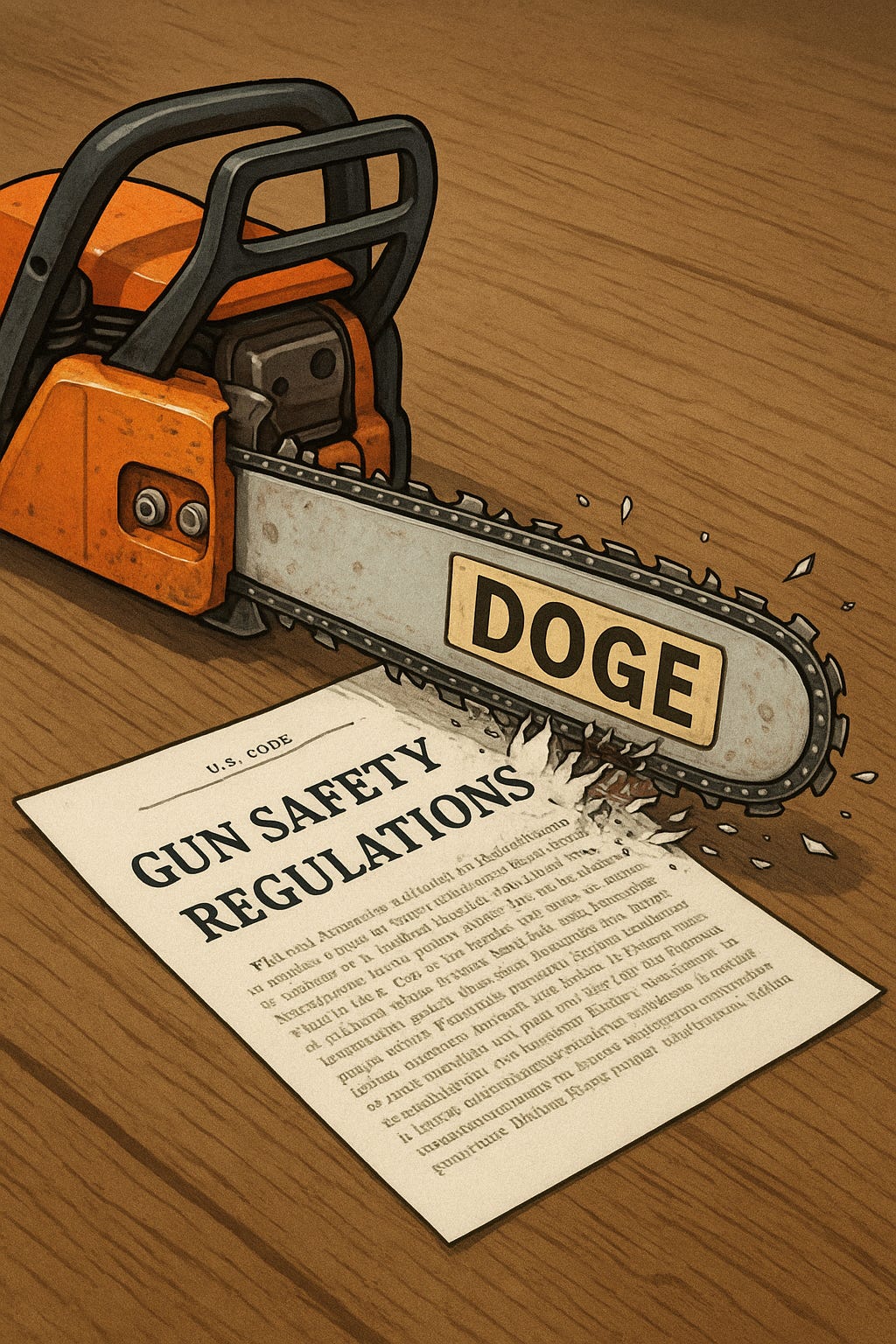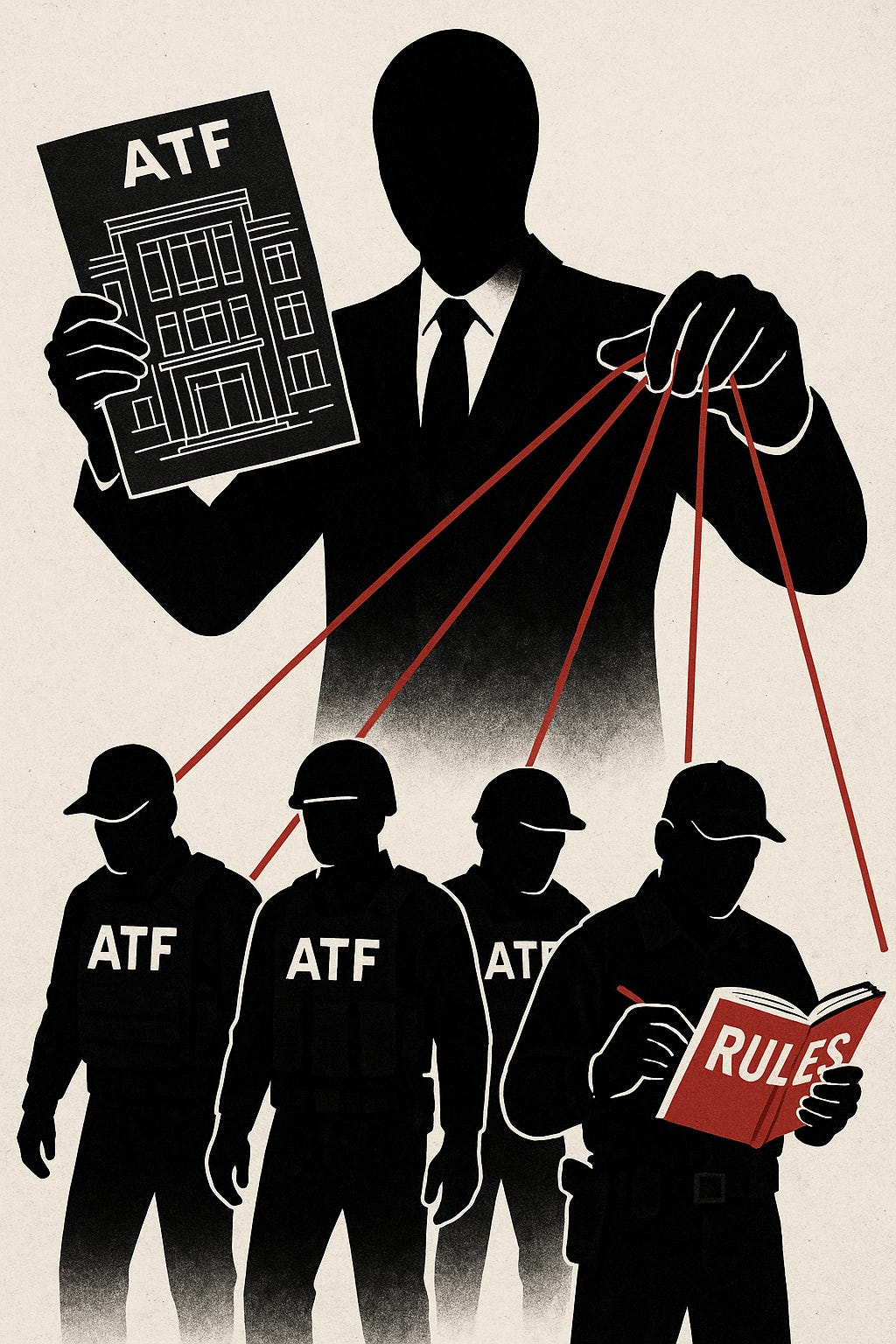DOGE Moves on the ATF: Inside the Regulatory Blitz Meant to Unravel Gun Safety
An unaccountable executive agency is slashing staff, gutting oversight, and eliminating decades of gun regulations, setting the stage for increased violence and authoritarian “law and order” response.
On June 27, multiple outlets reported a quiet yet explosive shift within one of the country’s most important law enforcement agencies. The Department of Government Efficiency (DOGE)—an unelected body with no congressional oversight—has embedded itself within the Bureau of Alcohol, Tobacco, Firearms and Explosives (ATF), with orders to eliminate more than 50 regulatory protections by July 4.
This isn’t reform. It’s a political ambush.
At the same time DOGE is pushing for the gutting of essential gun safety rules, it’s also slashing the ATF’s enforcement workforce by 62%, cutting over 500 inspector positions. The result? A radically weakened regulatory body is overseeing a country already plagued by gun violence.
The stated deadline, Independence Day, is no coincidence. It’s a patriotic smokescreen to disguise a deeply anti-democratic power grab. And while the administration frames these actions as “efficiency,” what we’re witnessing is an orchestrated breakdown of public safety infrastructure.
This isn’t about shrinking government; it’s about hollowing it out to the point of failure, and then using the consequences of that failure as justification for greater control.
We just hit 17,000 subscribers—thank you!
Get exclusive access for just $1/week or $52 a year.
Get exclusive analysis and fearless reporting you won’t find in corporate media.
Scope and Speed
The scale of DOGE’s operation inside the ATF is staggering, not just for its ambition, but for its velocity.
By July 4, less than a week after its existence was made public, DOGE is tasked with reshaping more than 50 regulatory rules governing firearms sales, dealer compliance, and record-keeping. These aren’t outdated procedural footnotes. Many of these regulations form the legal foundation of how guns are bought, sold, tracked, and investigated in the United States.
Among the most alarming changes:
ATF Form 4473, the core background check form required for all firearm sales, will be cut from seven pages to three. Critical disqualifiers such as those related to mental health, military discharge, and drug use will be compressed into a single, vague question.
Existing rules that trigger scrutiny or revocation for firearm dealers with patterns of noncompliance are on the chopping block, replaced with weaker standards that critics say will empower repeat violators.
Traceability requirements which help law enforcement track firearms used in crimes, are being “streamlined,” which experts say is code for crippled.
At the same time, DOGE is helping oversee a massive personnel cut: more than 500 of the ATF’s 800 inspectors will be laid off or reassigned, leaving only about 300 to police nearly 9,000 federally licensed gun dealers nationwide.
This is not a minor administrative tweak. It is a full-frontal assault on the ATF’s ability to function.
The timeline alone is disqualifying. Under normal rulemaking, regulatory changes undergo months of public notice, comment, legal review, and justification. Instead, DOGE is executing a mass rewrite in seven days, behind closed doors, with no public input and no oversight.
If this were truly about improving agency performance, the administration would be building capacity, not detonating it.
We’ve reported extensively on DOGE. See some of that reporting here:
Note this article is more than 45 days old and now lives in the archive. Consider becoming a paid subscriber for full access to the 700+ article archive and exclusive perks.
Chaos by Design
To call this deregulation effort chaotic is generous. It is not the result of mismanagement or haste; it is the result of intention. The chaos is the plan.
DOGE’s agenda inside the ATF isn’t just about removing regulations. It’s about removing the people who enforce them. Their proposed cut of 541 of the agency’s 800 Industry Operations Investigators (IOIs) would slash regulatory enforcement by 62%, leaving only about 300 inspectors to oversee nearly 9,000 federally licensed gun dealers across the country.
That’s not streamlining. That’s sabotage.
It comes on top of the earlier plan, revealed in March, to reassign 1,000 ATF special agents to the FBI, a move orchestrated by MAGA loyalist Kash Patel, who simultaneously holds leadership roles in both agencies. Combined, these actions would reduce the ATF’s total enforcement capacity by nearly half.
See our reporting on the reassignment of ATF special agents to the FBI here:
Note: This article is more than 45 days old and now lives in the archive. Consider becoming a paid subscriber for full access to the 700+ article archive and exclusive perks.
What would remain is an enforcement shell, an agency nominally tasked with safeguarding the nation against illegal gun trafficking, but functionally incapable of doing so.
This is not a hypothetical. We’ve seen what happens when gun laws are weakened and oversight disappears:
Illegal trafficking spikes.
Straw purchases go unchecked.
Ghost guns flood the streets.
Firearms used in crimes go untraced.
And yet, DOGE’s blueprint accelerates that vulnerability, while the administration calls it efficiency.
This type of chaos doesn’t simply “happen.” It is manufactured. It is designed to break systems, destabilize institutions, and create the conditions for a crisis that can later be framed as a justification for more authoritarian control.
This is not deregulation but the purposeful erosion of public safety infrastructure. It’s not being done for the sake of government efficiency. It’s being done to engineer a breakdown that will justify a crackdown.
From Disorder to “Law and Order”
The United States already suffers from a gun violence crisis unmatched in the developed world. The logical policy response would be to strengthen oversight, increase enforcement, and empower agencies like the ATF. Instead, this administration is doing the opposite and not by accident.
The deregulation DOGE is spearheading—combined with the forced reduction of ATF staff—is being deployed in a context where the agency is already deprioritizing the investigation of right-wing domestic militias. As our April report detailed, the Trump administration, under Kash Patel’s dual leadership of both the FBI and ATF, has actively restructured law enforcement to weaken firearm oversight and shield ideologically aligned groups from scrutiny.
That power grab included a plan to reassign 1,000 ATF agents to the FBI, blurring the lines between agencies and undermining their respective missions. Experts warned that the move would breed dysfunction, disrupt investigations, and open the door to overt political interference in law enforcement. Gun safety advocates called it a deliberate attempt to "gut the ATF" under the guise of efficiency.
Now, DOGE’s incursion into ATF reads like the next chapter in that same playbook.
By destabilizing ATF oversight and weakening gun regulation at the precise moment far-right extremism continues to fester, and by simultaneously reducing the agency’s capacity to enforce what few rules remain, the administration is creating the conditions for unregulated armed groups to flourish.
And here’s the turn: when violence spikes or a high-profile shooting shocks the nation, this administration won’t accept responsibility. Instead, it will demand a “tough-on-crime” response:
More police.
More federal militarization.
More surveillance.
More repression, especially in communities already over-policed and under-protected.
This isn’t an oversight. It’s a cycle. Break the system, then blame the chaos to justify authoritarian crackdowns. We’ve seen it before—at the border, during protests, and now, in the very agency meant to track firearms and prevent their abuse.
Why It’s Illegal
Beyond its recklessness, the DOGE-led overhaul of the ATF appears to be plainly unlawful, violating multiple pillars of administrative and constitutional law. This isn’t just bad policy. It’s a brazen test of how far executive overreach can go before the courts or public push back.
1. Violating the Administrative Procedure Act (APA)
Federal law requires that substantive regulatory changes, especially those affecting public safety, go through a formal rulemaking process:
Publish proposed rules.
Solicit public comment.
Justify final actions with clear reasoning.
None of that has happened here. DOGE, acting through embedded staff and internal pressure, is directing ATF to change policies without transparency, input, or legal justification. This is a textbook violation of the APA.
2. The Appointments Clause Problem
DOGE’s leadership—functionally exercising control over federal agencies—is not confirmed by the Senate. Under the Constitution’s Appointments Clause, only officers properly appointed by the President and confirmed by the Senate can wield such power. Courts have already flagged this issue in ongoing litigation related to DOGE’s structure, and it's directly relevant here.
3. Federal Advisory Committee Act (FACA) Violations
If DOGE is operating in an advisory role to ATF, as the administration insists, it is still subject to FACA requirements:
Balanced representation.
Transparent records.
Public disclosure of meetings and recommendations.
DOGE’s total secrecy, lack of public record, and ideological alignment violate every standard FACA was designed to uphold.
4. Agency Action Under Duress
Perhaps the most potent legal argument: the ATF is not acting independently. These decisions are being made under direct pressure from DOGE, an outside body with no statutory authority to enforce or direct regulatory policy. Courts have already invalidated similar actions, most recently striking down DOGE’s attempt to take over the U.S. Institute of Peace, because they were the result of coercion, not lawful agency discretion.
This isn’t about streamlining paperwork. It’s about dismantling democratic safeguards.
And it’s moving fast, faster than the law is meant to allow, which is why legal action must be just as swift.
How to Stop This
This fight isn’t theoretical. It’s active. The most immediate and effective line of defense isn’t Congress. It’s your State Attorney General.
State AGs have already proven they can take on DOGE. In recent months, they've:
Blocked DOGE’s unauthorized access to Treasury payment systems.
Sued over illegal data access and mission creep.
Forced senior DOGE officials to testify under oath.
They also have the legal standing to challenge the ATF directives, especially since deregulation will directly impact state law enforcement coordination, gun crime investigations, and public safety outcomes. These aren't abstract harms. They're real, documentable, and urgent.
The most compelling argument is that the ATF’s actions are being taken under coercion from DOGE, rather than through legitimate agency discretion. That claim has precedent. In the U.S. Institute of Peace case, a federal judge struck down DOGE’s restructuring efforts for that exact reason: the agency’s decisions were not its own.
State AGs can do more than just file. They can:
Seek immediate injunctions to pause rule changes before July 4.
Force disclosure of DOGE’s internal communications.
Compel oversight hearings through multistate pressure campaigns.
This isn’t just about fighting bad policy. It’s about defending the rule of law itself.
Congress should also act, and we’ll address that later. Still, in the coming days, state-level legal intervention is our best hope of stopping this deregulation train before it crashes into public safety infrastructure.
This Is Not Reform. It’s Retaliation.
What’s happening at the ATF is not the byproduct of rushed governance or poor planning. It’s a carefully executed plan to break an agency, one already under siege, and use the resulting chaos as a pretext for exerting more control, force, and fear.
This is not about making the government work better. It’s about making it work only for the powerful, and only for those aligned with a radical ideological vision. When regulation is dismantled and enforcement capacity is gutted, the only thing left is violence and the excuse to police it with military precision.
The ATF isn’t just being deregulated. It’s being dismantled. And the timing is no accident.
There is still time to act but only just.
Raise Your Voice, While We Still Can
Call Your State Attorney General
Demand immediate legal action to stop DOGE’s illegal interference in the ATF.
Use this language:
“I’m deeply concerned about DOGE’s coercive influence over the ATF. The agency’s rule changes are not independent—they’re being made under duress. Please file suit immediately and request an injunction to stop this unlawful action.”
Contact Your Members of Congress
Tell them to:Hold emergency oversight hearings.
Investigate DOGE’s shadow operations.
Pass legislation clarifying DOGE’s limits and restoring ATF capacity.
Support Legal Watchdogs and Gun Safety Groups
Groups like Giffords, Everytown, CREW, Public Citizen, and American Oversight are preparing legal challenges and fighting to expose what’s happening.
Help them do it faster.Share This Story
The administration is counting on the public not paying attention.
Prove them wrong.
We just hit 17,000 subscribers—thank you!
Get exclusive access for just $1/week or $52 a year.
Get exclusive analysis and fearless reporting you won’t find in corporate media.
Bibliography:
“DOGE Enters ATF with Mandate to Slash Gun Regulations.” Washington Post, June 27, 2025.
“Musk’s DOGE Goons Are Shooting Down Gun Regulations in the Trumpiest Way Possible.” The Daily Beast, June 27, 2025.
“DOGE Enters US ATF with Mandate to Slash Gun Regulations, Washington Post Reports.” Reuters, June 27, 2025.
“Judge Blocks Trump Officials’ Efforts to Dismantle US Institute of Peace.” The Guardian, May 19, 2025.
“Army Secretary in Unprecedented Move to Run ATF.” Politico, April 9, 2025.
“FBI Director Kash Patel Removed as Acting ATF Head.” Reuters, April 9, 2025.
“U.S. Senate Democrat Questions FBI on Domestic Terrorism Staff Reassignments.” Reuters, April 8, 2025.
“Ghost Guns, Straw Purchases Flood Amid Regulatory Rollbacks.” Washington Post, June 27, 2025.












I wish Sinclair Lewis or George Orwell was still alive to see this I Told You So moment.
I don’t have a gun. Doge is willing to do anything to cut federal spending.